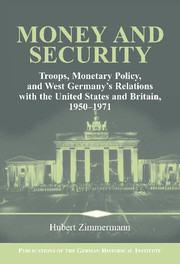 Money and Security
Money and Security Published online by Cambridge University Press: 05 January 2013
the mcnamara-hassel meeting of may 1966
At no point in its long and convoluted history did the troop-cost conflict become visible to the public with such spectacular consequences as during Chancellor Ludwig Erhard's desperate mission to Washington in September 1966. All the problems embedded in the never-ending controversy about the sharing of the conventional defense burden in Europe emerged and reinforced each other, resulting in a postwar low in German-American and German-British relations. In hindsight, the failure of Erhard's visit seems almost inevitable. Why did offset become such an explosive issue? The reasons for the inability of politicians on all sides to defuse the bomb in time are central to the understanding of transatlantic relations in the 1960s.
The offset crisis did not come as a bolt from the blue. Most German experts concerned with the execution of the offset agreements knew, even in early 1965, that a continuation of full offset through German purchases of American weapons after 1967 was practically impossible. Furthermore, it soon became apparent that even the targets for 1965-7, agreed on in the Hassel-McNamara protocol of 1964, would be reached - if at all - only by counting nonmilitary purchases or other substitutes. This was something the Americans had always resisted. During a cabinet meeting in March 1966 German ministers together with Bundesbank officials, who now took part in the deliberations concerning offset, noted that without a federal supplementary budget later in the year it would be impossible to honor the agreement with the United States.
To save this book to your Kindle, first ensure [email protected] is added to your Approved Personal Document E-mail List under your Personal Document Settings on the Manage Your Content and Devices page of your Amazon account. Then enter the ‘name’ part of your Kindle email address below. Find out more about saving to your Kindle.
Note you can select to save to either the @free.kindle.com or @kindle.com variations. ‘@free.kindle.com’ emails are free but can only be saved to your device when it is connected to wi-fi. ‘@kindle.com’ emails can be delivered even when you are not connected to wi-fi, but note that service fees apply.
Find out more about the Kindle Personal Document Service.
To save content items to your account, please confirm that you agree to abide by our usage policies. If this is the first time you use this feature, you will be asked to authorise Cambridge Core to connect with your account. Find out more about saving content to Dropbox.
To save content items to your account, please confirm that you agree to abide by our usage policies. If this is the first time you use this feature, you will be asked to authorise Cambridge Core to connect with your account. Find out more about saving content to Google Drive.